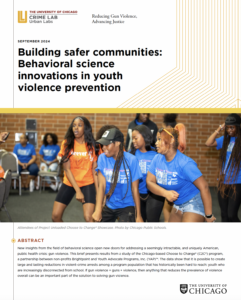Jan 2017
Gun Violence in Chicago, 2016
The Crime Lab studied the spike in murders in 2016.
A total of 764 people were murdered in Chicago in 2016. They were sons, brothers, and fathers; sisters, daughters, and mothers; they were, as the title of The New York Times reporter Fox Butterfield’s book on urban violence noted, All God’s Children. This report represents a first step towards understanding what happened with the goal of helping the city of Chicago prevent another year like the one that just passed.
We draw on data obtained from the Chicago Police Department (CPD) and other sources to provide a more complete picture of the change in our city’s crime problem in 2016. Our analysis highlights a number of key facts that are important for understanding what happened, but also raises some new puzzles as well. While this report focuses on establishing basic facts and avoids delving too deeply into solutions, we will continue to partner with policymakers, the civic community, and local nonprofits to identify promising approaches for moving forward. We plan to share our thinking about how to reduce violence in Chicago, informed by the best available data and research, in other venues in the future.

Longer-Term Impacts of a Youth Behavioral Science Intervention: Experimental Evidence from Chicago
This paper details updated results from a study of Choose to Change® (C2C®), a trauma-informed cognitive behavioral therapy and intensive mentoring program developed by nonprofits Brightpoint and Youth Advocate Programs, Inc. (YAP).

Choose to Change® (C2C®) Program Guide
This program guide is intended for community-based organizations working to fill gaps in services and reach an underserved population of youth impacted by violence and trauma.

Building safer communities: Behavioral science innovations in youth violence prevention
This policy brief highlights results from a large-scale randomized controlled trial that evaluated the impact of Choose to Change® (C2C®) on participants’ criminal justice involvement.

Unpacking the Impacts of a Youth Behavioral Health Intervention: Experimental Evidence from Chicago
This working paper details results from a study of Choose to Change® (C2C®), a trauma-informed cognitive behavioral therapy and intensive mentoring program developed by nonprofits Brightpoint and Youth Advocate Programs, Inc. (YAP).
Latest Updates
The best way to cut gun violence, and it’s almost free
In an op-ed for Crain’s Chicago Business, Crime Lab Pritzker Director Jens Ludwig highlights the importance of using data-informed practices to improve public safety and shares key insights from behavioral economics that provide a playbook for addressing gun violence that is both effective and low-cost.

Research on cognitive behavioral therapy for at-risk youth
Dr. Nour Abdul-Razzak joins host Jennifer Doleac on the Probable Causation podcast to discuss the Choose to Change program—an intervention that integrates trauma-informed therapy with comprehensive support to reduce youth violence and improve educational outcomes.

Deaths of decision-making are killing American teens. Schools can fix it.
Crime Lab executive director Katie Hill pens an op-ed for Brookings about how cognitive behavioral programs can teach teens decision-making skills that can dramatically reduce violence and save lives – often at little or no additional cost.

